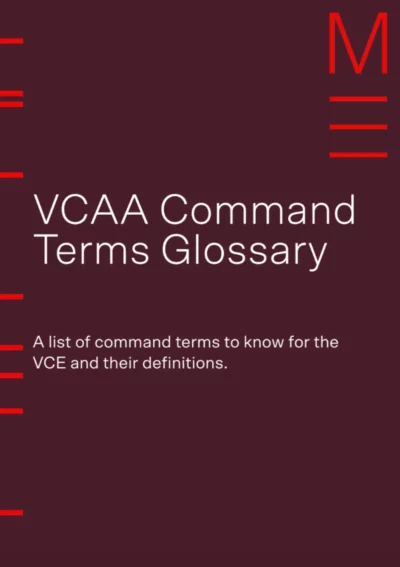Welcome to Matrix Education
To ensure we are showing you the most relevant content, please select your location below.
Select a year to see courses
Learn online or on-campus during the term or school holidays
Learn online or on-campus during the term or school holidays
Learn online or on-campus during the term or school holidays
Learn online or on-campus during the term or school holidays
Learn online or on-campus during the term or school holidays
Learn online or on-campus during the term or school holidays
Learn online or on-campus during the term or school holidays
Get HSC exam ready in just a week
Select a year to see available courses
Science guides to help you get ahead
Science guides to help you get ahead
Learn how to answer VCAA Command Terms with our full explanations and science example questions!

Join 75,893 students who already have a head start.
"*" indicates required fields

Join 8000+ students each term who already have a head start for English, Maths, OC/Selective Prep, Science, Biology, Chemistry or Physics.
Knowing and responding to the VCAA command terms correctly is one of the best ways to boost your VCE exam results. These terms tell you exactly what examiners want in your answers.
If you don’t give an adequate response to the question, you could lose marks even if you know the content. This guide will help you confidently tackle the most common command terms for VCE, using science questions as examples.

In this article, we’ll discuss:
Command terms are the verbs in exam questions that tell you what kind of answer you should provide. They indicate how much detail to include and what to focus on. By mastering these terms, you can shape your answers to match exactly what examiners are looking for.
Knowing command terms is essential because they guide how you approach each question. If a question asks you to “discuss” but you only “describe”, you’ll miss out on the depth and format needed for full marks.
By understanding each term, you’ll be able to give clear, focused responses that meet the examiners’ expectations.
Key takeaway: Knowing how to answer the VCAA command terms helps you avoid mistakes and score higher.
Get the full list of VCAA Command Terms, and apply them to any subject!
Understand exactly what exam questions are asking with the VCAA Command Terms Glossary Fill out your details below to get this resource emailed to you. "*" indicates required fields
Maximise your marks with VCAA Command Terms

Maximise your marks with VCAA Command Terms
The ALARM (A Learning and Responding Matrix) is a tool that helps tackle different types of questions based on VCAA command terms. It places the terms into different categories or ‘bands’.
On the left side, you’ll find command terms that need straightforward answers. As you move to the right, the terms require more detailed, complex, and structured responses, with more critical thinking involved.
ALARM: Use this matrix to help you answer your questions and achieve full marks.
Learn the levels of ALARM, so that when you see a command term in an exam question, you know how in-depth your response needs to be.
If you’re unsure about the term while you’re in the exam, look at the marks allocated for the question. This can give you a clue about how complex your answer should be.
Also consider that each subject may require a different approach for the same command term. Answering “evaluate” in Maths is different from how you’d answer it in English or Science. Don’t forget the context of the subject when responding to command terms.
Let’s start from the most basic level and learn how the command term helps you frame your answer.
This category of questions tests your recall of basic information. This could include listing examples or stating a number without explanations or calculations.
Answers should be short, factual and straight to the point – they may not even require a full sentence. These terms are usually worth 1-2 marks and may appear as part a) of a longer question.
VCE Physics example: State the atomic number of helium.
VCE Chemistry example: Name the class of reaction that replaces one atom or group of atoms in a compound with another atom or group of atoms.
VCE Biology example: Identify the type of cell that produces antibodies.
Questions using these terms require more detailed and structured information than the previous level. For example, you may need to provide the steps of a practical investigation in order.
These questions are usually worth between 2-4 marks because they require more than recalling a single concept. You need to flesh out the ideas or present them in a logical sequence.
Physics example: Outline a practical investigation to determine the relationship between range and launch angle for a projectile.
Chemistry example: Suggest a method to determine the anode and cathode in an electrolytic cell that electrolysed water.
Biology example: Describe the role of chloroplasts in a plant cell.
This level tests your ability to make connections between cause and effect. You must do more than just describe a theory – you need to show how it works and its impact in a given situation.
Your answer should include references to specific scientific principles and any relevant equations. Set out all steps clearly and make the connections explicit to prove that you understand the relevant concepts. The marker won’t assume you know something if you don’t write it down.
Physics example: Explain how Young’s double-slit experiment provides evidence for a wave model of light.
Chemistry example: The boiling point of ethanoic acid is higher than that of propan-1-ol despite both having a similar molar mass. Account for the difference in their boiling points.
Biology example: Explain how an enzyme converts a substrate into a product.
At this level, you need to go beyond the base facts of the subject. You’ll need to connect related concepts to answer questions about new scenarios, like a modified technology or a new device design.
This also includes second-hand investigation questions where you analyze and interpret data.
Your answer should directly address the situation or stimulus material, and cite relevant theory. Use the same terminology as the question or diagram to make the links clear.
These questions are where markers start to separate the highest-performing students from the rest of the crowd.
Look through past papers to find these types of questions and practice comparing them to the scenarios you studied in class.
Physics example: Apply Faraday’s and Lenz’s Laws to the brushed DC motor to explain why it has a maximum operating speed.
Chemistry example: Consider the graph below. Discuss two possible disturbances that could have occurred at t = 5 minutes.
Biology example: The graph below shows the growth rate of plants exposed to different levels of light and soil moisture. Analyse the results.
These questions require you to meet all the standards of the previous level and then reach a logical conclusion. Good answers usually consider different angles of the question. This could be the pros and cons of a technology or the strengths and weaknesses of a scientist’s theory.
Even though writing skills aren’t directly tested, the best answers use evidence and a clear structure. Like an English essay, a long response should make and support several points to address the question.
To get full marks, you must clearly state your final ‘judgment!’
Physics example: Evaluate the impact of de Broglie’s hypothesis on the development of a quantum model of the atom.
Chemistry example: Assess the potential of hydrogen as a viable alternative to fossil fuels.
Biology example: Evaluate the use of recombinant DNA technology in medicine.
Studying command terms is just as important as knowing the content. Here are some tips to help you master VCAA command terms and succeed in your VCE exams.
Understand exactly what exam questions are asking with the VCAA Command Terms Glossary Fill out your details below to get this resource emailed to you. "*" indicates required fields
Maximise your marks with VCAA Command Terms

Maximise your marks with VCAA Command Terms
Written by Matrix Education
Matrix is Sydney's No.1 High School Tuition provider. Come read our blog regularly for study hacks, subject breakdowns, and all the other academic insights you need.© Matrix Education and www.matrix.edu.au, 2023. Unauthorised use and/or duplication of this material without express and written permission from this site’s author and/or owner is strictly prohibited. Excerpts and links may be used, provided that full and clear credit is given to Matrix Education and www.matrix.edu.au with appropriate and specific direction to the original content.